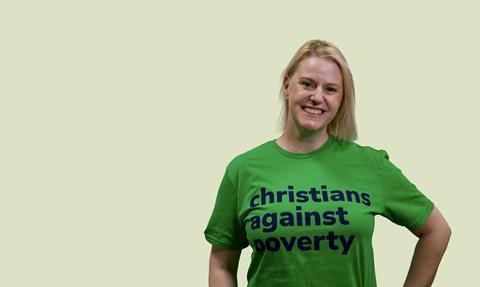Katie Johnson from Christians Against Poverty tells her own story and provides financial tips

I am a middle child of five. My mum was a super star, having us five and childminding many more children. I think I just wanted to be caring like she was. I volunteered with children and adults with learning and physical difficulties, and the elderly from around the age of 14. Later, I went to the University of Winchester to study and graduated with a BA Hons in learning disabilities…and a husband-to-be!
We got married in 2002 and the following year my dad passed away suddenly. My world fell apart. Two months later, I became pregnant with my first child but then lost my job just as my husband had reduced his hours. My mum also came to live with us. That was when our manageable debt became unmanageable debt.
A few years later, while I was pregnant with our third child and working towards repaying debts, my heart stopped. I had to have a pacemaker implanted. I went into organ failure after I gave birth and a year later also had cervical cancer. All of this was extremely difficult for our family and had a huge impact on our finances.
I had 17 different creditors and about eleven different credit cards. I was juggling between paying one and paying the other until my debt got up to £53,000.
In 2006, I was talking with a friend about how difficult it was to ‘keep up with the Joneses’, when she said she had entered into a debt management plan. This seemed like an answer to a prayer, although I didn’t pray at the time, so I followed her recommendation and sought help with my debts.
‘I was almost £53,000 in debt’
I had just started to take the kids to Sunday school, but thought church really wasn’t for me. At the time, I was still very angry at God after losing my dad so he had a fight on his hands to get me to believe, but then everything changed.
I was invited to a church camp and heard CAP’s founder John Kirkby share his personal testimony and about the work of CAP. My husband and I both gave our lives to Jesus that very same day and God gave me a mission to join CAP and help others struggling in debt.
I think CAP is unique in the way it helps people out of debt and at the same time shares Jesus – as Jesus transforms everything! That’s why I’m still as motivated and passionate about the work we do as I was 15 years ago.
The one piece of financial advice I wish I’d known when I was younger
Make a budget! I used to feel like budgeting was something that I never needed to do, but I learned on CAP’s money coaching just how vital it is. I managed to pay off my debts in almost half the time just by following the budgeting principles I learned from money coaching.
My debt repayment plan was set to last 21 years but I paid off everything I owed in eleven years and I’m now completely debt free!
Even though I’m now out of debt I still use the money coaching techniques. A budget is for life, not just for when you’re in debt, because it helps you prepare for any future curveballs life may throw at you.
I have never felt so free and so in control of my finances. I love it!

Money matters
Katie answers some common questions about money.
Q: I always seem to be overdrawn by the end of the month. What tips do you have for living within my means?
• Start by building your budget Put an hour aside to open your online banking app or get a few recent bank statements and make a note of what money you have coming in and all the things you spend it on.
• Plan ahead Consider everything you need to save for in the coming months. Work out the total cost and divide it between the months you have left to save for it so you can put some money away each month to cover the total cost. This is much better than scrambling to find a way to afford a big cost with just one pay packet.
• Review your budget Consider what you can cut back on, cut cost on by finding a cheaper alternative or what non-essentials you can cut out completely to help you try and avoid living in your overdraft or falling into debt.
• Stick to it The final step may be the most challenging but stick to your budget. Once you have decided on your plan, be consistent and disciplined and over time you will certainly see the benefits. Having control of your finances can be such a weight lifted off your shoulders – it’s worth the effort!
Q: How do I add tithing into my budget when I can barely make ends meet?
We can tithe more than just our treasure. What about tithing your time and talents and volunteering to help your local church and community? If you want to tithe financially then look to add it into your budget or maybe cut out something that’s not essential and tithe the money it would’ve cost for that item instead.
Q: How bad is it if I don’t pay off my credit card every month?
This all depends on the terms of your credit card, the interest rate and whether you can afford any additional costs. It’s important to remember that if your credit card is charging you interest, this can quickly add up. A £1,000 debt on a 25 per cent credit card will cost you £250 a year. If you can get ahead of things and avoid long-term credit card debt, this could save you a lot of money.
It’s important to use credit wisely. Read all the terms and conditions before borrowing so you can make an informed decision based on your circumstances.
Credit can be a useful tool in certain circumstances but if you’re constantly struggling to pay off your credit card or using it to pay for essentials like food or energy bills then that’s a warning sign that you could be in financial trouble. It might be a good idea to seek free debt advice – moneyhelper.org.uk is a great place to find a range of help.
Changes in circumstances can also quickly turn a manageable debt situation into an unmanageable one. If you feel you are in an unmanageable debt situation visit capuk.org to find out about what support we offer locally or moneyhelper.org.uk.
Christians Against Poverty (CAP) was founded in 1996 by John Kirkby. Their services are free for people of all faiths and none. Visit capuk.org/help to find out what help is available in your local area.




























No comments yet